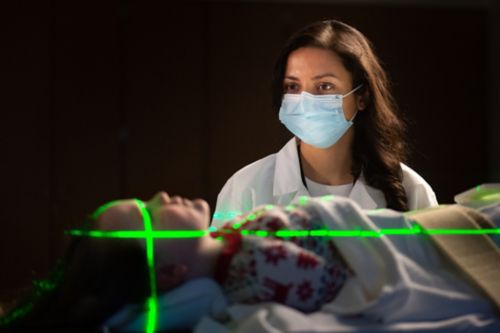Talking with Your Child’s Care Team about Your Radiation Safety Questions
You should always feel comfortable asking members of your child’s care team questions about tests and treatments. That includes imaging tests.
After your child has gone through cancer treatment, you may be worried that additional doses of radiation could raise their risk of developing cancer again.
Imaging Tests are Low Risk

Radiologists, technicians, and other members of your child’s care team take steps to ensure imaging tests use the lowest dose of radiation possible.
Here’s some good news for you. Medically necessary imaging tests like follow-up X-rays and CT scans involve a very low dose of radiation. In fact, it’s comparable to the level of radiation that’s present in the environment in the United States.
And when these tests are medically necessary, they have benefits that outweigh any risks. Benefits include:
- Knowing if treatment is working
- Finding and diagnosing types of cancer
- Ensuring cancer hasn’t returned
Also remember that radiologists, technicians, and other members of your child’s care team take steps to ensure imaging tests use the lowest dose of radiation possible.
Even knowing this, you may still have some questions. If that’s the case, these tips can help you prepare for an appointment.
Asking Your Child’s Care Team Questions
Here are some questions to ask your child’s care team if you’re concerned about radiation exposure:
- Why is the test needed?
- Will the results change the treatment decisions?
- Is there an alternative test that doesn’t involve radiation?
- If my child has a genetic cancer predisposition, is this test still a good option for them?
Also, if you have any specific questions about your child’s condition, it’s a good idea to talk to your child’s care team about them. Those might include questions about:
- How radiation impacts the specific type of cancer your child has
- How treatments your child had in the past might put them at risk from additional radiation
- What your child’s care team hopes to learn from the test
Write your questions down or print them out before your child’s appointment. You can bring a notebook, laptop, or tablet to take notes.
When you’re armed with answers and the information you need, you’ll feel more comfortable with any imaging tests your child needs.
Key Points
- Medically necessary imaging tests (like CT scans) are low risk and beneficial.
- Imaging tests use low doses of radiation. It’s comparable to background radiation in the U.S.
- You should always feel comfortable asking your child’s care team questions about tests they recommend for your child.
- Writing down a list of questions before your appointment can help. It’s also a good idea to write down the answers.
- Your child’s care team will work with you and support you.





